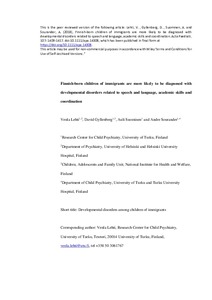Finnish-born children of immigrants are more likely to be diagnosed with developmental disorders related to speech and language, academic skills and coordination
Andre Sourander; Venla Lehti; Auli Suominen; David Gyllenberg
https://urn.fi/URN:NBN:fi-fe2021042719233
Tiivistelmä
Aim: We examined the association between having at least one parent born abroad and being diagnosed with a developmental disorder related to speech and language, academic skills or coordination.
Methods: This nested case–control study was based on Finnish population records for 1996–2007. Cases from the Finnish Hospital Discharge Register were diagnosed with developmental disorders of speech and language, academic skills and coordination by the end of 2012. We identified 28 192 cases and 106 616 matched controls.
Results: Children were more likely to be diagnosed with developmental disorders if they had an immigrant mother than children with two Finnish‐born parents, with an adjusted odds ratio (aOR) of 1.3 and 95% confidence interval (95% CI) of 1.2–1.4, an immigrant father (aOR 1.2, 95% CI 1.1–1.3) or two immigrant parents (aOR 1.5, 95% CI 1.3–1.6). The level of development of the parental country of origin was not associated with receiving a diagnosis.
Conclusion: Children of immigrant parents were more likely to be diagnosed with developmental disorders and the association was strongest with regard to speech and language disorders. There were similar adjusted odds ratios for mothers, fathers and both parents. The development level of the country of origin was irrelevant.
Kokoelmat
- Rinnakkaistallenteet [19207]
